|
|
|
Sort Order |
|
|
|
Items / Page
|
|
|
|
|
|
|
| Srl | Item |
| 1 |
ID:
145267


|
|
|
|
|
| Summary/Abstract |
In the aftermath of the Arab Spring the Middle East has plunged into a state of instability. The United States has responded to these rising insecurities in a region of strategic importance with hesitation or half-hearted commitments. The Obama administration, plagued by the increasingly difficult decision of defining America's role in an apolar world while managing the political and economic legacy of the Bush administration, has relied on a policy of delegation. Obama neither refrained from military options nor showed any willingness to commit American ground troops to one of the strategically and operationally most complex environments of the world. Instead, Obama's preferred way of war is one relying on surrogates—both human and technological—that allow the United States to externalize, partially or wholly, the strategic, operational and tactical burden of warfare. Unlike any other previous US administration surrogate warfare has become the principal means of protecting US interests in the Middle East that are perceived to be all but vital. The need for deniability and legitimacy, cost–benefit considerations as well as the lack of capability have made warfare by surrogate a preferred option in the Middle East. The consequences for US policy in the region are profound, as the lack of control and oversight have empowered surrogates whose long-term interests are not compatible with those of the United States. More severely, the US might have jeopardized its standing as the traditional guarantor of security in the Middle East— something that partners and adversaries alike have exploited.
|
|
|
|
|
|
|
|
|
|
|
|
|
|
|
|
| 2 |
ID:
145263
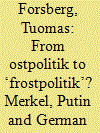

|
|
|
|
|
| Summary/Abstract |
Germany's relationship with Russia has historically been one of the most crucial in shaping Europe's fate. Despite radical transformation in the nature of European Great Power politics, it continues to be pertinent from the perspective of today's world. Germany's willingness to establish good relations with the Soviet Union in the late 1960s—its emphasis on economic relations and cooperation instead of political disagreements—prepared the ground for the end of the Cold War and German unification twenty years later. Germany's basic policy towards Russia remained broadly unchanged despite German unification and changes in the domestic political coalitions and leadership, sometimes against political expectations. In the European context, Germany's attitude towards Russia created the backbone of EU–Russia relations. During 2012–13, however, the continuity in Germany's policy towards Russia was seen as having come to an end. Political twists came to the fore and the atmosphere was loaded with tensions, made worse by the Ukrainian crisis. This article reviews the recent, alleged changes in Germany's policy towards Russia during the Merkel era. It asks two basic questions: first, whether Germany's policy really has changed and if it has, what are the theoretical tools that give us the best potential understanding of these changes? The article argues that the policy has changed, but not as dramatically as made out by some headlines. Moreover, the article suggests that a key element in analysing the degree of change in Germany's policy towards Russia is neither the external power relations nor domestic politics and related changes in the prevailing interpretation of national interest, though these are important too, but the interaction between the leaders and foreign policy elites.
|
|
|
|
|
|
|
|
|
|
|
|
|
|
|
|
| 3 |
ID:
145265
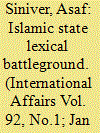

|
|
|
|
|
| Summary/Abstract |
This article suggests that President Obama's consistent references to the extremist Sunni group as ‘ISIL’ (Islamic State of Iraq and the Levant) is not a trivial matter of nomenclature. Instead, the Obama administration's deliberate usage of the ISIL acronym (as opposed to other commonly-used terms such as ‘Islamic State of Iraq and Syria’ or ‘ISIS’, ‘Islamic State’, ‘IS’, ‘so-called Islamic State’ and ‘Daesh’) frames the public perception of the threat to avoid engagement with the requirements of strategy and operations. Both the labelling and the approach could be defended as a response to the unique challenge of a transnational group claiming religious and political legitimacy. However, we suggest that the labelling is an evasion of the necessary response, reflecting instead a lack of coherence in strategy and operations—in particular after the Islamic State's lightning offensive in Iraq and expansion in Syria in mid-2014. This tension between rhetoric, strategy and operations means that ‘ISIL’ does not provide a stable depiction of the Islamic State. While it may draw upon the post-9/11 depiction of ‘terrorism’, the tag leads to dissonance between official and media representations. The administration's depiction of a considered approach leading to victory has been undermined by the abstraction of ‘ISIL’, which in turn produced strategic ambiguity about the prospect of any political, economic or military challenge to the Islamic State.
|
|
|
|
|
|
|
|
|
|
|
|
|
|
|
|
| 4 |
ID:
145266


|
|
|
|
|
| Summary/Abstract |
Missile defence plays an increasing role in NATO and in most US alliances in Asia, which raises the question of what impact it has on the management of extended deterrence. Extended deterrence relies on the threat of escalation. Since the costs of escalation are different for different allies, the management of extended deterrence is inherently difficult. Missile defence shifts the relative costs of conflict, and therefore also impacts on the alliance bargains that underpin agreement on extended deterrence strategy. Although increased defensive capacity is a clear net benefit, the strategic effects of its deployment and use can still be complex if, for example, missile defence increases the chances of localizing a conflict. The article discusses the role of missile defences for the US homeland, and of the territory and population of US allies, for extended deterrence credibility and the reassurance of US allies in Asia and in NATO. It argues that there is increased scope in strengthening deterrence by enmeshing the defence of the US homeland with that of its allies, and that allies need to pay closer attention to the way the deployment and use of missile defence influence pressures for escalation. In general, missile defence thus reinforces the need for the United States and its allies in Europe and Asia to negotiate an overall alliance strategy.
|
|
|
|
|
|
|
|
|
|
|
|
|
|
|
|
| 5 |
ID:
145262
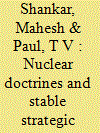

|
|
|
|
|
| Summary/Abstract |
This article offers a discussion of nuclear doctrines and their significance for war, peace and stability between nuclear-armed states. The cases of India and Pakistan are analysed to show the challenges these states have faced in articulating and implementing a proper nuclear doctrine, and the implications of this for nuclear stability in the region. We argue that both the Indian and Pakistani doctrines and postures are problematic from a regional security perspective because they are either ambiguous about how to address crucial deterrence related issues, and/or demonstrate a severe mismatch between the security problems and goals they are designed to deal with, and the doctrines that conceptualize and operationalize the role of nuclear weapons in grand strategy. Consequently, as both India's and Pakistan's nuclear doctrines and postures evolve, the risks of a spiralling nuclear arms race in the subcontinent are likely to increase without a reassessment of doctrinal issues in New Delhi and Islamabad. A case is made for more clarity and less ambition from both sides in reconceptualizing their nuclear doctrines. We conclude, however, that owing to the contrasting barriers to doctrinal reorientation in each country, the likelihood of such changes being made—and the ease with which they can be made—is greater in India than in Pakistan.
|
|
|
|
|
|
|
|
|
|
|
|
|
|
|
|
| 6 |
ID:
145264
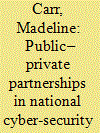

|
|
|
|
|
| Summary/Abstract |
Despite its centrality in the national cyber security strategies of the US and the UK, the public–private partnership is a nebulous arrangement, which is especially problematic in the context of critical infrastructure protection. Privately owned and operated critical infrastructure that is regarded as a potential national security vulnerability raises questions about the allocation of responsibility and accountability in terms of cyber security. As with many aspects of cyber security, this issue is often discussed with little reference to previous scholarship that could provide conceptual scaffolding. This article draws on the extensive literature on public–private partnerships in order to assess the tensions and challenges of this arrangement in national cyber-security strategies. It finds that there is a serious disjuncture in expectations from both ‘partners’. The government regards privately owned and operated critical infrastructure as a key element of national security but is reluctant to claim a mandate to oversee network security. At the same time, the private sector is not inclined to accept responsibility or liability for national cyber security. This challenge for governments to manage national cyber security raises questions about how well equipped these states are to promote their own security in the information age. Acknowledging the flaws in the ‘partnership’ is an essential step towards addressing them.
|
|
|
|
|
|
|
|
|
|
|
|
|
|
|
|
| 7 |
ID:
145268
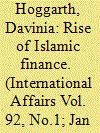

|
|
|
|
|
| Summary/Abstract |
Islamic finance signifies more than a projection of religious affiliation. The importance of Islamic finance is increasing in central Asia, both as a source of capital and as a form of post-colonial market-building. In central Asia, it is an important facet of the new phenomena of ‘nation-branding’ and a means of reinvigorating the economy. In identity politics, Islamic finance projects an attitude of religious tolerance allowing states in the region to reposition their geopolitical identity relative to the Islamic community. This creates a ‘performance’ of Islamic finance that facilitates the creation of legitimacy for the state. Adopting Islamic finance projects images of the state's religious tolerance and diversity without changing the underlying structures; it suggests an ‘Islamicness’ that is useful to the development and post-colonial goals of the state. As such, it creates opportunities for geopolitical alliances with Muslim countries. Economically, it appeals to rising financial-industrial elites seeking new investment-opportunities, which reduces pressure on the state to democratize. Meanwhile, in Russia, Islamic finance is an alternative source of capital for the sanctions-hit state and a useful identity marker with which to connect to the increasingly wary Caucuses and Commonwealth of Independent States countries, lending it a wider significance across Eurasia.
|
|
|
|
|
|
|
|
|
|
|
|
|
|
|
|
| 8 |
ID:
145271
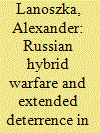

|
|
|
|
|
| Summary/Abstract |
Russia's use of force against Ukraine since early 2014 has prompted some observers to remark that it is engaging in ‘hybrid warfare’. This form of military statecraft has made other former Soviet republics, such as the Baltic countries, fear that Russia would use subversion rather than pursue a conventional military engagement against them. Despite this concern about Russian hybrid war, existing descriptions of this form of war suffer from conceptual weaknesses. In this article hybrid warfare is conceived as a strategy that marries conventional deterrence and insurgency tactics. That is, the belligerent uses insurgent tactics against its target while using its conventional military power to deter a strong military response. The article then outlines why some former Soviet republics are susceptible to Russian hybrid warfare, allowing it to postulate inductively the conditions under which hybrid warfare might be used in general. The analysis yields two policy implications. First, military solutions are not wholly appropriate against hybrid warfare since it exploits latent ethnic grievances and weak civil societies. Second, only under narrow circumstances would belligerents resort to hybrid warfare. Belligerents need to be revisionist and militarily stronger than their targets, but they also need to have ethnic or linguistic ties with the target society to leverage in waging hybrid warfare.
|
|
|
|
|
|
|
|
|
|
|
|
|
|
|
|
| 9 |
ID:
145269


|
|
|
|
|
| Summary/Abstract |
The quinquennial Nuclear Non-Proliferation Treaty (NPT) Review Conference represents a highly important event from the perspective of the EU Common Foreign and Security Policy (CFSP). Though not a party to the treaty itself, the EU has made a consistent effort since the 1990s to coordinate the positions of its member states and achieve higher visibility in the NPT review process. The aim of this article is to examine the role of the EU in the 2015 NPT Review Conference deliberations. Drawing on on-site observations, statements and in-depth research interviews, it argues that the recent institutional changes notwithstanding, the influence of the EU as a distinct actor in the NPT context remains very limited, and the EU's common position is in bigger disarray than ever before. This year's Review Conference demonstrated the widening rift between the member states, in particular in the area of nuclear disarmament and the related issues. The inability to maintain a coherent common position limits the EU ‘actorness’ and impedes its striving for relevance in the NPT forums. The dynamics outlined in this article further highlight the limits of the EU CFSP in security matters in which the national positions of individual member states are as divergent as in the case of nuclear disarmament.
|
|
|
|
|
|
|
|
|
|
|
|
|
|
|
|
| 10 |
ID:
145270
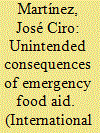

|
|
|
|
|
| Summary/Abstract |
This article dissects the role of emergency food aid during the current Syrian conflict. Drawing on Séverine Autesserre's concept of frames and Giorgio Agamben's theory of sovereignty, we argue that the neutrality frame, which undergirds the majority of humanitarian relief efforts in Syria, obfuscates the impact of emergency food aid, both on sovereign power relations and local political dynamics. While neutrality appears benign, it has had a tangible impact on the Syrian civil war. Through close scrutiny of various case-studies, the article traces how humanitarian efforts reinforce the bases of sovereign politics while contributing to a host of what Mariella Pandolfi (1998) terms ‘mobile sovereignties’. In the process, humanitarian organizations reaffirm sovereign power while also engaging in similar activities. We then analyse how and why ostensibly neutral emergency food aid has unintentionally assisted the Assad regime by facilitating its control over food, which it uses to buttress support and foster compliance. By bringing external resources into life-or-death situations characterized by scarcity, aid agencies have become implicated in the conflict's inner workings. The article concludes by examining the political and military impact of emergency food assistance during the Syrian conflict, before discussing possible implications for the humanitarian enterprise more broadly.
|
|
|
|
|
|
|
|
|
|
|
|
|
|
|
|
|
|
|
|
|